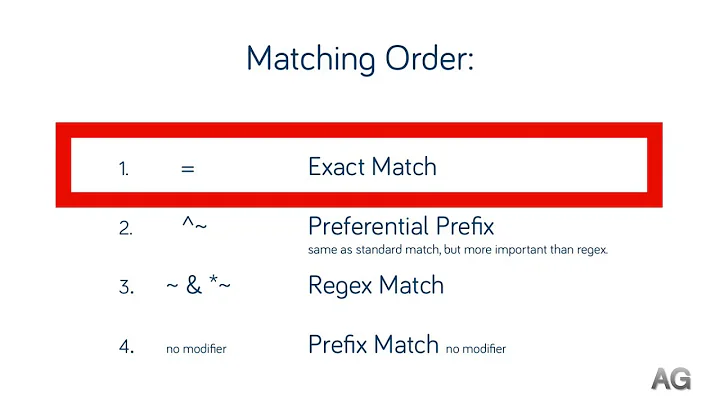Nginx location regex is not matching
I would try it without the brackets around \d, brackets are normally used for either contiguous characters or numbers, your brackets say match either character '\' or 'd'
"^(.*)(\d{10})\.(min\.)?(css|js)$"
Also, are you specifically saving the group info that you're capturing inside the parens?
For clarity on the comments below.
Start simple.
"^.*[0-9]*\.css$"
"^.*[:digit:]*\.css$"
"^.*\d*\.css$"
Depending on which works, use that base for the digits and expand as below.
"^.*\d{10}\.(min\.)?(css|js)$"
If you're matching the http/https as well, you can start it with the http/s stuff below, remember to change to which ever digit notation worked.
"^http(s)?://.*[0-9]{10}\.(min\.)?(css|js)$"
Related videos on Youtube
Chris Montanaro
Updated on September 18, 2022Comments
-
 Chris Montanaro 8 months
Chris Montanaro 8 monthsThe following has been working to cache css and js for me:
location ~ "^(.*)\.(min.)?(css|js)$" { expires max; }results:
$ curl -I http://mysite.com/test.css HTTP/1.1 200 OK Server: nginx Date: Thu, 16 Jan 2014 18:55:28 GMT Content-Type: text/css Content-Length: 19578 Last-Modified: Mon, 13 Jan 2014 18:54:53 GMT Connection: keep-alive Expires: Thu, 31 Dec 2037 23:55:55 GMT Cache-Control: max-age=315360000 X-Backend: stage01 Accept-Ranges: bytesI am trying to get versioning setup for my js / css using a 10 digit unix timestamp and am having issues getting a regex match with the following valid a regex.
location ~ "^(.*)([\d]{10})\.(min\.)?(css|js)$" { expires max; }results:
$ curl -I http://mysite.com/test_1234567890.css HTTP/1.1 200 OK Server: nginx Date: Thu, 16 Jan 2014 19:05:03 GMT Content-Type: text/css Content-Length: 19578 Last-Modified: Mon, 13 Jan 2014 18:54:53 GMT Connection: keep-alive X-Backend: stage01 Accept-Ranges: bytes-
 Sergey over 9 yearsTry to run nginx in debug mode, you will certainly see reg_exp match or not, You also need provide us full nginx.conf, because some other rules can be triggered earlier.
Sergey over 9 yearsTry to run nginx in debug mode, you will certainly see reg_exp match or not, You also need provide us full nginx.conf, because some other rules can be triggered earlier.
-
-
 Chris Montanaro over 9 yearsstill not working without the square brackets, I am currently not using the info I am capturing
Chris Montanaro over 9 yearsstill not working without the square brackets, I am currently not using the info I am capturing -
 rfelsburg over 9 yearsAre you matching on the http string? And are you just looking for a string containing the ten digits and css/js ending?
rfelsburg over 9 yearsAre you matching on the http string? And are you just looking for a string containing the ten digits and css/js ending? -
 Chris Montanaro over 9 yearsYse, this is a location block that is included in a server declaration. I am looking for a 10 digit number in the name ending in .css, .js, .min.css or .min.js
Chris Montanaro over 9 yearsYse, this is a location block that is included in a server declaration. I am looking for a 10 digit number in the name ending in .css, .js, .min.css or .min.js -
 Congmin over 9 years@rfelsburg, i'm not sure why you claim that
Congmin over 9 years@rfelsburg, i'm not sure why you claim that[:digit:]*is going to match anything of interest, the docs say it should be more like[[:digit:]]*, if anything. mdoc.su/o/re_format.7 -
 rfelsburg over 9 years@cnst First off, don't be an ass. Secondly, You don't use two brackets unless you're trying to match a null expression at the beginning/end. If you read the posix page you just posted, you'll see where it states under character classes: Within a bracket expression, the name of a character class enclosed in
rfelsburg over 9 years@cnst First off, don't be an ass. Secondly, You don't use two brackets unless you're trying to match a null expression at the beginning/end. If you read the posix page you just posted, you'll see where it states under character classes: Within a bracket expression, the name of a character class enclosed in[:' and:]' stands for the list of all characters belonging to that class. -
 Congmin over 9 years@rfelsburg, go ahead, provide wrong solutions, and call people names who point out your mistakes.
Congmin over 9 years@rfelsburg, go ahead, provide wrong solutions, and call people names who point out your mistakes.echo 111 | sed -E "s#[[:digit:]]#a#g" -
 rfelsburg over 9 yearsAgain, did you actually look at the documentation you provided? I don't know how it's my mistake, when the example I pulled at the bottom was word for word form the page you submitted.
rfelsburg over 9 yearsAgain, did you actually look at the documentation you provided? I don't know how it's my mistake, when the example I pulled at the bottom was word for word form the page you submitted. -
 nickgrim almost 8 years@rfelsburg: Those docs - and your quote - say that you can use e.g.
nickgrim almost 8 years@rfelsburg: Those docs - and your quote - say that you can use e.g.[:digit:]within a bracket expression i.e. use it like[[:digit:]]. The outer set is the bracket-expression, the inner set is the character-class.




